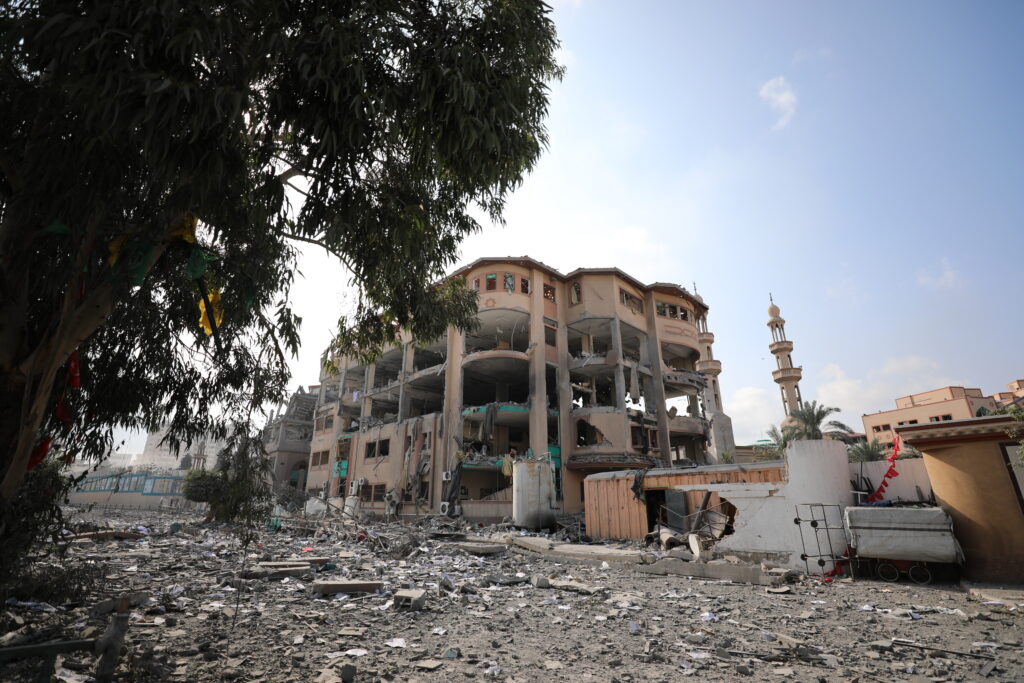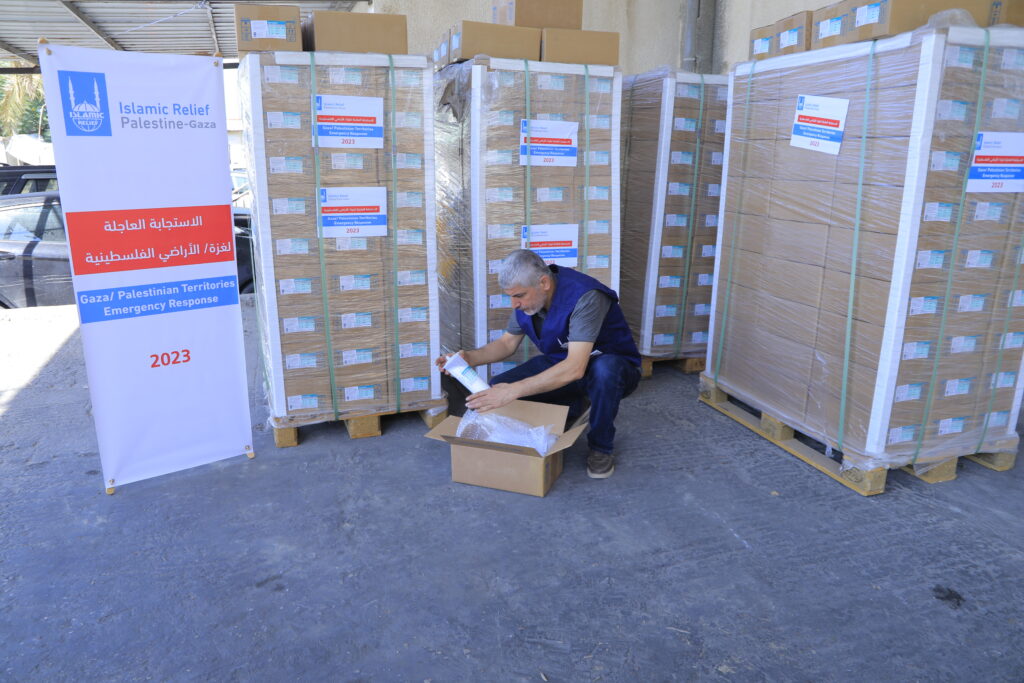Amid an unprecedented escalation in the region, an Islamic Relief worker* and father-of-2 living in Gaza describes the dire humanitarian situation facing civilians in the enclave.
The situation on the ground here in Gaza is unimaginable: terrifying, frustrating, and extremely life threatening. As I write, it has been 5 days since the crisis began and Israeli airstrikes have totally destroyed parts of Gaza City.
From where we are it feels indiscriminate, it’s like a total demolition of neighbourhoods. Imagine waking up in London and finding that the Stamford Bridge area had been totally wiped out. This is what we’re experiencing.
Last night was full of fear. Al Karama, a neighbourhood northwest of Gaza, was hit. Residents who could evacuate managed to leave, but there are families with old and sick relatives and people with disabilities who could not get out.
Even for those who left before their homes were reduced to rubble, there is no safe place to go in Gaza. We do not have shelters that can withstand airstrikes. Every time there is an airstrike, our house shakes as if there’s been an earthquake. I am not sure how long the buildings will stand.
Streets turned upside down
We barely have internet in my house. When it is available, all I can do is send messages to my family and friends who are still alive. I’ve started posting on Facebook daily and the difference between my social media status updates and those of my friends elsewhere is heartbreaking. I’m not posting amusing memes, smiling selfies, or photos of yesterday’s delicious meal – I am confirming that me, my wife and children are still breathing.
I also use these brief moments with internet connection to grab snippets of information about what’s happening elsewhere in Gaza and beyond. I try to piece together what is happening and what, if anything, I can do to help protect my loved ones from harm.

On social media last night, we started hearing from Al Karama, people were trapped in their houses in need of help. Terrifying stories emerged. There were claims of white phosphorous being used, and as I am writing, I still do not know what really happened in the neighbourhood**. The sounds of bombs falling kept on until morning.
Another time we managed to get online, we witnessed shocking images from Al Remal, downtown Gaza’s commercial district, considered the crown jewel of the city.
The streets were upside down. Buildings reduced to rubble and ash, trees ripped from their roots and even pets lying dead in the streets. I can’t understand what I’m seeing.
My kids have a much-loved pet cat. We just got it a few months ago and they’re telling me we need to take him with us if we are evacuated, they have his food and litter prepared to go. These last few days I’ve seen the cat hiding in small areas around the house, terrified of the sounds it hears.
Dwindling food and water supplies
The bombardment and destruction we’re experiencing means a huge humanitarian crisis is sure to be on the horizon.
Supplies from the only power plant will stop soon*** because Israel has imposed a total blockade on Gaza. No fuel is allowed to run the power plant. Even before this we only had power for 4 hours out of every 36 hours.
At home, my family and I can’t find drinking water. I’m telling my kids over and over to be careful using what water we have. We used to have a home water filtration unit, but it’s blocked with salt and other minerals. We have gone back to using it even though we know the water is dangerous: years ago the United Nations pointed out Gaza’s undrinkable water was slowly poisoning us. What choice do we have?
The water we use for washing is frequently cut and residents of the building that I live in have dug our own water well. However, pumping water from it to the tanks on the building’s roof is a huge challenge, especially when there is no electricity.

Now food is becoming rare. Suppliers are not able to reach their farms for vegetables and poultry, while supplies of items such as rice, flour and sugar are running out. I have some food in my house, but only enough for another couple of days, if we continue to use it carefully. Going out to get new supplies is a dangerous trip that will put me in great danger. I don’t even know what I’d be able to afford to buy, since food prices have shot up as supplies dwindle.
With the total blockade the situation will worsen. All services will stop, affecting hospitals, water supplies, sewage treatment plants, and internet lines. This mean Gaza will be in total blackout, creating more uncertainty and danger.
I am already hearing through the radio that paramedics and ambulance staff, as well as journalists, have been killed and humanitarian organisations are calling on the international community to take a stand and defend civilians’ right to safety.
A lifetime of suffering
We have lived the hardest life. I am 40 years old, and I have witnessed 2 intifadas, tens of invasions, countless escalations. I have faced obstacles to travelling, to being accepted by the countries of the world, and to realising even my basic human rights.
My kids – 8 and 6 years old – started their lives amid explosions and bombardment. Their concept of the world has developed under fire and airstrikes. They always ask why we are living like this. Every time they ask, I feel a tide of emotion rising up inside me.
I am unable to simplify this complicated context for them. In fact, when I think about their questions, I can’t find simple answers for myself. How come we are in the 21st century, with growing movements advocating for human rights, for minorities, and for democracy but there are still 5 million people living and suffering throughout the Occupied Palestinian Territory?
It is really shocking to see the international community unresponsive to the suffering of the Palestinian population.
Please help Islamic Relief to support people in desperate need in Gaza. Donate to our Palestine Emergency Appeal now.
*This blog has been anonymised for our colleague’s safety and security.
**These claims have since been reported by a human rights group.
***The power supply from this plant has since been stopped.
Read the full series of blogs here.
Editor’s note: This blog was submitted amid a fast-changing situation on the ground, which has since continued to deteriorate. The information was correct as of afternoon of Wednesday 11 October, with updates indicated with *.
BROWSE OTHER OPINIONS
FEATURED OPINIONS
- Why children in Siramana village no longer worry about falling snakes and sunstroke at school
- “Ramadan is over but we mustn’t forget about those suffering in Mali”
- Since the truce ended, I fear the grave is the only safe place in Gaza
- Honouring our humanitarian heroes – before, during and after the pandemic
- Celebrating our humanitarian heroes – and remembering those we have lost
MOST POPULAR TOPIC
View More









